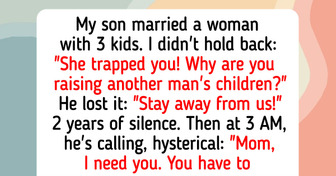Stop being shocked and start being furious and disgusted. Only thing you need a lawyer for is divorce and full custody of YOUR baby.
My MIL Doesn’t Want to Be a Grandma—She Wants to Be My Baby’s Mom

A mother-in-law is supposed to offer love, wisdom, and maybe the occasional unsolicited advice—but for Natalie, what her MIL asked for left her speechless. Just weeks after giving birth to her son Ethan, she was blindsided by a shocking request: her mother-in-law wanted to legally adopt her newborn baby. Reeling from confusion, Natalie reached out to us with one question: Is there ever a good reason for someone else to adopt your child?
Here's Natalie's letter:
My MIL told me she wanted to adopt my baby. I was so stunned, I rushed home to tell my husband. He called her for answers. I was shocked to know that my husband agreed with his mom! I was even more shocked to discover that my MIL didn’t waste a second—she immediately sent a lawyer to draw up all the papers as soon as possible.
I was in disbelief. My husband explained why she wanted to adopt Ethan. Apparently, for the past few weeks, my MIL had been having the same dream over and over again. She didn’t want to frighten us with her dreams, but as they kept repeating, she thought it was a sign that she needed to act.
In the dream, my husband and I were in a terrible car accident, and we didn’t survive. She said it was so vivid and repetitive that it felt like a warning—a prediction she couldn’t ignore. She was convinced that it wasn’t just a nightmare, but something that would eventually come true.
She believed it was her responsibility to make sure he was taken care of, and she wanted to secure herself as his legal guardian before anything could happen. In her mind, she couldn’t bear the thought of anyone else adopting Ethan.
Even if nothing happens and the dream turns out to be just that—a dream—she felt that she needed to take this step. After all, who else would take care of Ethan after us as parents? We don’t have any other close relatives, so in a way, her request started to make a bit of sense.
Now, I can’t help but wonder—maybe she’s right to think ahead about our baby’s future. Is it worth considering these things, even while we’re alive, just to ensure he’s secure?
Sincerely,
Natalie
Thank you, Natalie, for sharing your story and trusting us. We're sure that your situation will help many others who are thinking about the future of their children. We've gathered valuable insights and actions you can take to navigate this better.
Try not to think about "What if" scenerios.
We all get hit with the “What Ifs” sometimes, but they don’t have to run the show. You can manage them—often without therapy or meds—by changing how you think about them. Start with meta-cognition: pay attention to your thoughts and lean into the ones that lift you up. Don’t dodge your fears; accept them and all the weird, anxious thoughts that come with them.
Yes, thinking about something happening to you and your husband is surely uncomfortable. But, eventually, try welcoming the discomfort—it’s usually where the growth happens. And when life throws a curveball, just roll with it and keep going.
Distinguish parental instincts from overprotection.
Parenting instincts—and yeah, even that inclination to be a little too protective—aren't signals that someone's doing something wrong. Biology makes them a part of us. In your MIL's case, those recurring nightmares could have triggered that strong urge to defend her grandson at all costs, even if the situation doesn't require it in real life.
It's also important to note that overprotectiveness sometimes can do more damage than good. It may unwittingly promote dependency or internal struggle in naturally independent-thinking children who simply wish to learn things for themselves. Therefore, although it's perfectly reasonable that your MIL would want what's best for Ethan, it's fine—and indeed required—of you and your husband to set reflective boundaries.
Try to communicate with your husband.
It may be beneficial to recall that healthy communication is the basis of any healthy relationship, especially in unclear or emotional ones such as what you are currently going through. Every relationship presents its problems, but an honest, respectful form of communication makes it a whole lot easier to navigate through discord and come out stronger on the other side.
We're always being reminded to communicate, but we're not necessarily being taught how to do so. It can be an excellent opportunity for you and your husband to finally sit down, have a true discussion about your feelings, and make sure you're on the same page—without assumptions and conclusions. Straightforward, truthful discussions might not fix everything immediately, but they are a liberating move toward renewed trust and a resolution respecting all parties.
Reclaim your voice in family dynamics.
It's okay to say no—really. If you find yourself always ducking it, take that as a gentle nudge that something in the relationship may need tweaking. Conflict is totally normal in any relationship, and avoiding it doesn't make it disappear—it just suppresses it until it pops up again later.
Don't be afraid to let them know the way you feel; it isn't about being difficult to get along with, it's about being honest and taking care of yourself, too. Most times, the reaction you're dreading won't be half so bad as your mind is making it out to be. Other people might be shocked or even angry, but how they respond is their responsibility—not yours.
In this deeply personal story, one woman opens up about the pain of abandonment, the complicated emotions of reconciliation, and the unexpected moment her father asked her to save him. Read on to find out what she chose—and why.
Comments
Related Reads
My MIL Destroyed Our Expensive Wedding Cake — So I Got My Sweet Revenge

10 Holiday Gatherings That Proved Family Drama Has No Days Off

18 Seniors Whose Sharp Wit Proves Humor Only Gets Better With Age

I Refused to Give Up My Baby, So My Mom Exposed a Terrible Secret

16 Stories That Prove Kindness Still Wins in Our Broken World

16 Moments That Remind Us to Stay Kind Even If the World Turns Ice Cold

My Daughter Thought She Was Above Me, I Let Reality Prove Her Wrong

14 Times Reality Proved to Be a Better Screenwriter Than Hollywood Could Ever Be

20 Stories That Remind Us to Stay Kind Even When Life Stops Playing Fair

A Stranger Humiliated My Daughter at Disney World—He Picked the Wrong Mom to Mess With

I Refused to Let My MIL Own My Family Budget, Now My Marriage Is on Thin Ice

10 Moments Where Kindness Didn’t Argue—It Acted





